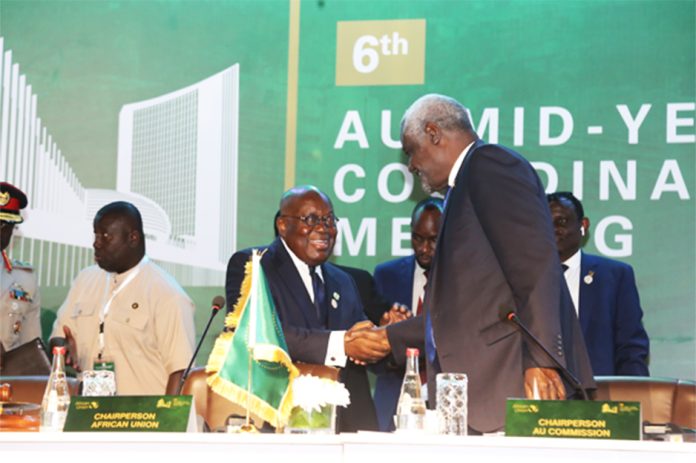The President, Nana Addo Dankwa Akufo-Addo, has urged the African Union to see to the establishment of the three financial institutions on the continent.
According to the President, the creation of the African Central Bank, the African Investment Bank and the African Monetary Fund was vital to achieving financial stability in Africa.
President Akufo-Addo said this at the Sixth Mid-Year Coordination Meeting of the African Union (AU) in Accra on Sunday, July 21, 2024.
He made the point that the continent could create a more cohesive and effective financial framework that ensures resources are allocated where they are most needed.
President Akufo-Addo called for a consolidation of the financial landscape, as he had observed that institutions and initiatives operated in silos, leading to inefficiencies, duplication of efforts and suboptimal utilisation of resources.
“Central to the realisation of this vision is the establishment of the three African financial institutions; the African Central Bank, the African Investment Bank and the African Monetary Fund.
“The creation of these institutions is vital to achieving the financial stability and economic integration necessary for the successful implementation of Agenda 2063,” President Akufo-Addo said.
HARMONY
He explained that the African Central Bank will harmonise monetary policies and ensure currency stability across the continent, mitigating the risks associated with exchange rate volatility and creating a predictable economic environment that fosters investor confidence and facilitates intra-African trade.
He opined that a stable and unified monetary policy will reduce transaction costs and increase the efficiency of Africa’s financial systems.
Concurrently, the African Investment Bank, he said, will be instrumental in mobilising and allocating resources for large-scale development projects, providing the financial backbone for key infrastructure and development initiatives, and accelerating progress towards the highest durations of Agenda 2063.
Additionally, the African Monetary Fund will provide financial assistance to member states facing balance of payments issues and economic shocks, boosting monetary cooperation and stability among African nations by reducing dependency on external financial institutions and promoting sound fiscal and monetary policies.
“The African Monetary Fund will support macro-economic stability and entrench financial sovereignty across the continent,” he added.
AU MEETING
The sixth AU mid-year coordinating meeting, which ended last Sunday, aimed to harmonise the AU’s policies with those of the Regional Economic Communities (RECs) and the Regional Mechanisms (RMs) and to deepen the Union’s integration agenda.
It deliberated on pressing issues of economic integration, interregional trade and operations as well as security on the continent.
The meeting, hosted by Ghana, had African Heads of States and Governments, the heads of the regional economic communities, the heads of the regional mechanisms and the members of the AU Commission, as well as continental stakeholders, taking part.
POLITICAL WILL
In his address, President Akufo-Addo urged other African presidents and the African Union Commission to demonstrate the political will and commitment necessary to drive the integration of the continent’s financial systems for the economic development of Africa.
“We must ensure that the legal frameworks and the requisite financial resources are in place to support the establishment and functioning of these institutions.
“The establishment of these financial institutions is not merely an administrative exercise; it is a bold and visionary step towards a unified, prosperous, and self-reliant Africa.
“It will be a testament to our collective resolve to take control of our financial destiny and build a future that reflects the true potential of our continent,” he said.
BACKGROUND
The legal instruments for the establishment of the African Investment Bank and the African Monetary Fund were adopted in 2009 and 2014, respectively.
However, ratification has become the stumbling block impeding the establishment of the institutions. None of the financial institutions has reached the requisite number of ratifications to enter into force.
At a consultative forum in 2023, it was also discussed that the insufficient funding for establishing the African Union Financial Institutions has been detrimental to the operationalization of the African Monetary Institutes, which is the first step towards the establishment of the African Central Bank.








